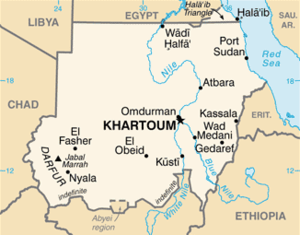 Image via WikipediaAt the stroke of midnight on 9 July 2011, South Sudanese burst into the streets to celebrate the birth of their new independent state. South Sudan in brief from the Government of Southern Sudan (GOSS):
Image via WikipediaAt the stroke of midnight on 9 July 2011, South Sudanese burst into the streets to celebrate the birth of their new independent state. South Sudan in brief from the Government of Southern Sudan (GOSS):
Known fondly as the "Heart of Africa", Sudan is the largest country on the African continent covering a total area of 2,505,813 sq. km. Southern Sudan borders Ethiopia to the east; Kenya, Uganda and Democratic Republic of Congo to the south; and Central African Republic to the west. The northern part is occupied by the vastly muslim Northern Sudan which controls the central government headquartered at Khartoum.According to the State Department, following its declaration of independence, the United States will establish full diplomatic relations with the Republic of South Sudan, upgrading the U.S. Consulate General in Juba to a U.S. Embassy on July 9. Ambassador Barrie Walkley, the U.S. Consul General in Juba, will serve as Chargé d’Affaires pending the appointment of a U.S. Ambassador to Juba.
Southern Sudan consists of ten states which formerly composed the provinces of Equatoria (Central Equatoria, Eastern Equatoria, and Western Equatoria); Bahr el Ghazal (Northern Bahr el Ghazal, Western Bahr el Ghazal, Lakes, and Warrap); and Upper Nile (Jonglei, Unity, and Upper Nile).
The United States Consulate General Juba opened in 2005. It is also the headquarters for the U.S. Agency for International Development mission in Juba. The Chargé d’Affaires, Ambassador Walkley previously served as Ambassador to the Gabonese Republic (2004-2007), accredited concurrently as Ambassador to the Republic of Sao Tome and Principe and was Ambassador to the Republic of Guinea (2001-2004). Since retiring from the Department of State, he has twice been called back into service. He was Charge d’Affaires in Mauritius/Seychelles (2009- 2010) and now as the Chargé d'Affaires in Juba. (Apparently if you're a retired ambassador it is okay to work in challenging posts even after you're past 65 years old, but not if you're an ordinary FSO on the brink of being officially old at the magic age of 6-5).
I must note that ConGen Juba's website was quickly upgraded to US Embassy Juba on Saturday. Its Facebook page has yet to catch up with the news when I last looked at it over the weekend. But even the CIA World Factbook need to do some catching up, its map of Sudan still includes South Sudan.
Created with Admarket's flickrSLiDR.
Photos from state.gov/Flickr
Delegation includes: Johnnie Carson, Assistant Secretary of State for African Affairs, Department of State; Ret. General Colin Powell, former Secretary of State for the United States; Ambassador Susan E. Rice, U.S. Permanent Representative to the United Nations; and Ambassador R. Barrie Walkley inaugurate the new U.S. Embassy in Juba, South Sudan on July 9, 2011.
Photos from state.gov/Flickr
Delegation includes: Johnnie Carson, Assistant Secretary of State for African Affairs, Department of State; Ret. General Colin Powell, former Secretary of State for the United States; Ambassador Susan E. Rice, U.S. Permanent Representative to the United Nations; and Ambassador R. Barrie Walkley inaugurate the new U.S. Embassy in Juba, South Sudan on July 9, 2011.
Anyway - for those looking for such an opportunity, there is a new ambassadorial gig, and its currently vacant. Not sure any of those bundlers would be interested in the garden spot of Juba, but one never knows. According to Wikipedia, Southern Sudan is covered in tropical forest, swamps, and grassland. Its protected areas also host the second largest wildlife migration in the world. And the White Nile passes through the country, even passing by its capital city, Juba. Technically speaking, you can river raft, but check before you start lobbying for the job.
And just so you know -- apparently back in 2004, there were only three surgeons serving southern Sudan, with three proper hospitals, and in some areas there was just one doctor for every 500,000 people. On July 10, Al Jazeera reports that the health ministry has plans to open a network of primary care centres - roughly one per 15,000 people - but none are fully operational. In addition, apparently, the military and police hospitals are closed, forcing hundreds of thousands of soldiers and officers to seek care from civilian facilities.
So if you want the gig, feel free to lobby your contacts at the White House. Just don't get sick when you get to Juba.



No comments:
Post a Comment